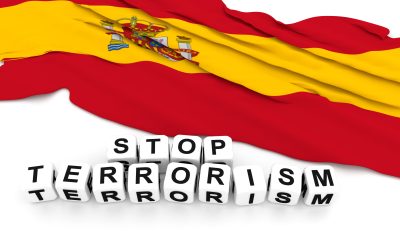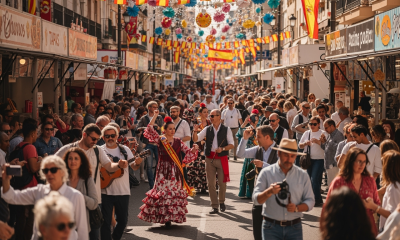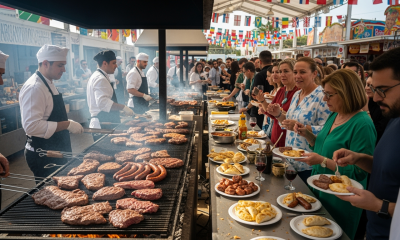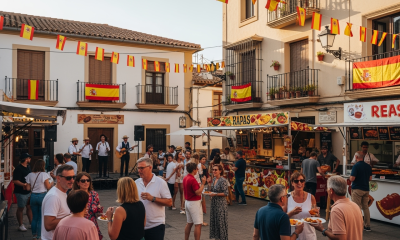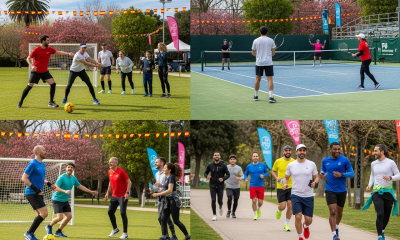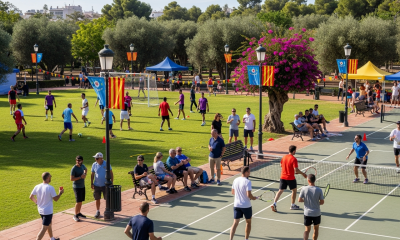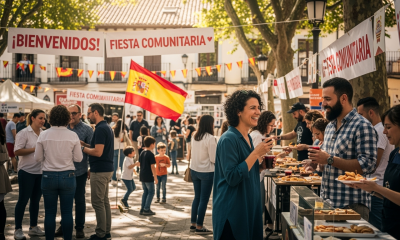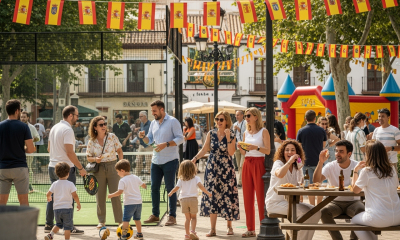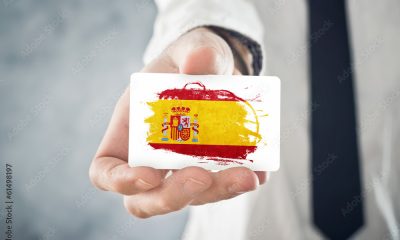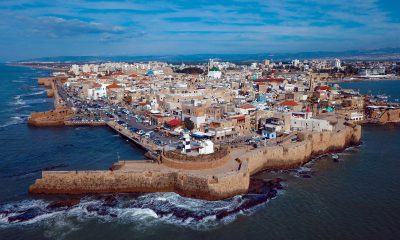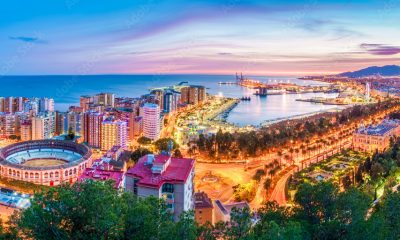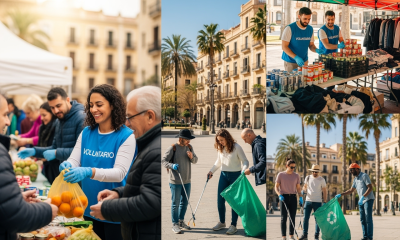Sport
Real Madrid

A Legacy of Excellence in World Football
Real Madrid Club de Fútbol, commonly referred to as Real Madrid, is one of the most iconic and successful football clubs in the world.
Founded in 1902, the club has built a rich legacy characterized by exceptional achievements, legendary players, and an unwavering global fan base.
Known for their distinctive white kits, Los Blancos have set benchmarks in football excellence both on and off the pitch.
Early History and Formation
Real Madrid was established on March 6, 1902, by a group of football enthusiasts led by Juan Padrós. Initially named Madrid Football Club,
the club quickly gained popularity in the burgeoning Spanish football scene.
In 1920, King Alfonso XIII granted the club the title “Real” (Royal), symbolizing its royal patronage and thus becoming Real Madrid.
Rise to Prominence
La Liga Dominance
Real Madrid has been a dominant force in La Liga, Spain’s top professional football division.
The club won its first La Liga title in the 1931-32 season and has since accumulated a record number of league titles.
The 1950s marked the beginning of Real Madrid’s golden era, with the club winning five consecutive European Cups (now known as the UEFA Champions League) from 1956 to 1960.
European Glory
The club’s success on the European stage is unparalleled.
Real Madrid has won the UEFA Champions League a record 14 times, solidifying its reputation as a powerhouse in international football.
The team’s remarkable performances in these tournaments have cemented their legacy as Europe’s elite.
Legendary Players
Real Madrid has been home to some of the greatest footballers in history. Players like Alfredo Di Stéfano, Ferenc Puskás, and Francisco Gento were instrumental in the club’s early success.
The club continued to attract top talent, including icons like Zinedine Zidane, Cristiano Ronaldo, and Raúl González.
Cristiano Ronaldo Era
Cristiano Ronaldo’s tenure at Real Madrid from 2009 to 2018 is often highlighted as one of the most successful periods in the club’s history.
Ronaldo scored an unprecedented number of goals, leading the team to multiple Champions League titles and setting numerous records.
Iconic Stadium
Santiago Bernabéu
The Santiago Bernabéu Stadium, named after the club’s legendary president Santiago Bernabéu, is one of the most famous football stadiums in the world.
Opened in 1947, the stadium has a seating capacity of over 81,000 and has undergone several renovations to maintain its status as a top-tier sports venue.
It has hosted numerous historic matches, including European Cup finals and FIFA World Cup games.
Management and Leadership
Presidents
Throughout its history, Real Madrid has been led by visionary presidents who have shaped the club’s direction and success.
Santiago Bernabéu Yeste, who served as president from 1943 to 1978, is often credited with transforming Real Madrid into a global football giant.
Florentino Pérez, the current president, has also played a pivotal role in modernizing the club and securing major signings.
Managers
Real Madrid has been managed by some of the most esteemed coaches in football, including Miguel Muñoz, Vicente del Bosque, and Zinedine Zidane.
Zidane, in particular, achieved remarkable success during his managerial tenure, leading the team to three consecutive Champions League titles from 2016 to 2018.
Rivalries
El Clásico
Real Madrid’s rivalry with FC Barcelona, known as El Clásico, is one of the most intense and widely followed rivalries in world football.
Matches between these two giants are not just about football; they symbolize regional pride and political tensions, attracting millions of viewers globally.
Other Rivalries
Apart from El Clásico, Real Madrid also shares fierce rivalries with Atlético Madrid, known as the Madrid Derby, and other prominent Spanish clubs.
These encounters are always highly competitive and eagerly anticipated by fans.
Financial and Commercial Success
Real Madrid is not only a football powerhouse but also a financial juggernaut.
The club consistently ranks among the richest football clubs in the world, thanks to lucrative sponsorship deals, broadcasting rights, and a massive global fan base.
Real Madrid’s brand is synonymous with success, luxury, and excellence.
Community and Social Responsibility
Real Madrid is actively involved in various community and social responsibility initiatives through its foundation. T
he Real Madrid Foundation focuses on promoting education, social integration, and sports development among underprivileged communities.
The club’s commitment to social causes reflects its role as a positive force beyond the football field.
Cultural
Get active with sports teams: a guide for expats in Spain

Published: August 2025
Getting involved in sports is one of the fastest and most enjoyable ways to integrate into Spanish life. Whether you’re a passionate football fan, a tennis enthusiast, or just want to stay fit and meet friends, Spain’s sports scene is vibrant, welcoming, and open to all. Joining a local team or club not only improves your health but also helps you build a social network and learn the language in a natural setting. Here’s how expats can get active with sports teams in Spain.
Why sports are so important in Spain
Spain is famous for its love of sports. From world-class football and basketball to padel, cycling, and running, there’s something for everyone. Sports bring people together, break down language barriers, and offer a fun way to experience Spanish culture. Many expats find their first local friends through shared training sessions, matches, or tournaments.
Popular sports and how to join
- Football (soccer): Nearly every town has local teams for all ages and levels. Check your municipal sports center.
- Padel and tennis: Spain is a global leader in padel. Most cities have public and private courts, with clubs offering lessons and social tournaments.
- Basketball: Many towns have amateur teams and leagues. Great for all ages and skill levels.
- Running and cycling: Join local clubs for group runs, bike rides, and races. Try Meetup.com for running groups.
- Swimming, yoga, fitness: Most municipal sports centers offer classes, open gyms, and pools.
How to join a team or club
- Check your local town hall’s website or visit the nearest sports center for a list of teams and clubs.
- Ask about open training sessions—many clubs let you try before committing.
- Bring your ID (passport/NIE) and be ready to fill out a short registration form.
- Most clubs charge a small monthly or annual fee. Equipment can usually be rented or borrowed at first.
- Don’t worry if your Spanish isn’t perfect—sports are a universal language!
Benefits of joining sports teams as an expat
- Meet locals and other expats in a relaxed, social environment
- Stay healthy and active all year round
- Improve your Spanish through real-life conversations
- Participate in tournaments, social events, and trips
- Get insider tips on local life and culture
Useful links
Do I need to speak Spanish to join a sports team? No, many clubs are used to welcoming expats and will help you learn as you go. How much does it cost to join a sports club? Fees are usually affordable (€10–€40/month), and many clubs offer free trial sessions. Can I join as a complete beginner? Absolutely! Most clubs have teams for all levels, and coaches are happy to help newcomers. Are there sports clubs for children and families? Yes, most towns offer youth leagues and family-friendly activities. What equipment do I need? Basic gear is often provided or can be borrowed until you decide to buy your own. How do I find out about local matches and events? Check club websites, local notice boards, or ask your teammates for info. Can I join more than one club? Yes, many expats join several clubs to try different sports and meet more people. Are there women-only or mixed teams? Both options are widely available—ask at your local sports center for details. How do I stay motivated to keep active? Set goals, join group challenges, and make it social—having friends on your team helps! Is it easy to make friends through sports? Yes, shared activities and teamwork make it one of the best ways to build a social network in Spain.
Disclaimer: This article is for informational purposes only. Always check with clubs or sports centers for the latest schedules and requirements.
Cultural
Join local clubs and associations: the key to integrating in Spain

Published: August 2025
One of the best ways to feel at home in Spain is to join local clubs and associations. Whether you’re passionate about sports, arts, volunteering, or simply want to meet new people, Spain offers an incredible variety of groups where expats and locals mix. Getting involved in clubs not only helps you build a social network, but also fast-tracks your language skills, cultural understanding, and sense of belonging. Here’s how you can make the most of Spain’s vibrant club scene.
Why clubs and associations matter for expats
Clubs are the heart of Spanish community life. From football and cycling to chess, hiking, art, and gastronomy, there’s a club for almost every interest. Joining a club is an easy way to meet people who share your passions, get insider tips on local life, and take part in events you might otherwise miss. Many expats find their first Spanish friends through these groups.
How to find the right club for you
- Check your local town hall (Ayuntamiento de Málaga) for a list of registered clubs and associations.
- Use Meetup.com to find international and local groups in your area.
- Look for flyers in community centers, libraries, and cafés—many small clubs still advertise offline.
- Ask neighbors, colleagues, or other expats for recommendations.
Popular types of clubs in Spain
- Sports clubs: Football, tennis, padel, running, cycling, basketball, yoga, and more.
- Hobby and interest groups: Photography, painting, chess, language exchange, cooking, book clubs.
- Volunteering associations: Animal rescue, environmental projects, social aid, Red Cross (Cruz Roja).
- Professional and networking groups: Young entrepreneurs, women in business, tech meetups.
- International clubs: Many cities have “International Friends” or “Expats in [City]” groups.
How to join and get involved
- Contact the club via their website, social media, or by attending an open event.
- Most clubs are happy to welcome newcomers—don’t worry if your Spanish isn’t perfect!
- Attend a few meetings or activities to see if the group is a good fit for you.
- Offer to help out or volunteer for events; you’ll make friends faster and feel more included.
Benefits of joining clubs and associations
- Meet locals and other expats with shared interests
- Practice Spanish in a relaxed, real-life setting
- Access to exclusive events, workshops, and trips
- Get insider tips on living in Spain
- Feel part of the community and reduce homesickness
Useful links
- Meetup.com – find groups in Spain
- Cruz Roja Española (Red Cross Spain)
- Ayuntamiento de Málaga – local clubs
- Expats in Spain Facebook group
Do I need to speak Spanish to join a club? No, many clubs welcome English speakers and are used to helping newcomers. Joining is a great way to improve your Spanish. How much does it cost to join a club? Most clubs charge a small annual fee (€20–€100), but many events are free or pay-as-you-go. Can I join more than one club? Absolutely! Many expats join several clubs to explore different interests and meet more people. Are there clubs for families and children? Yes, there are sports teams, music groups, and cultural associations for all ages. How do I find out about club events? Follow your club on social media, check their website, or sign up for newsletters. Is volunteering a good way to meet people? Yes, volunteering is a fantastic way to make friends and contribute to your community. What if I’m nervous about joining alone? Most newcomers feel the same way—clubs are used to welcoming people who come alone. Can I create my own club if I don’t find what I’m looking for? Yes, it’s easy to start a new group—use Meetup.com or Facebook to invite others. Are there online-only clubs? Yes, many hobby and language groups meet online or combine online and in-person events. How do I stay updated about new clubs in my area? Check your town hall’s website, local notice boards, and expat forums regularly.
Disclaimer: This article is for informational purposes only. Always check club websites or contact organizers for the most up-to-date information.
Cultural
Why social life matters for expats in Spain

Published: August 2025
Moving to Spain is about more than just finding a home or a job – it’s about building a life. For expats, developing a social network is one of the most important (and rewarding) parts of settling in. A strong social life helps you integrate, improves your well-being, and opens doors to opportunities you might never have found otherwise. In this article, we explore why social life matters so much for expats in Spain, and how you can make the most of it.
The importance of connection
Research shows that expats with an active social life adapt faster and feel happier in their new country. In Spain, where community is woven into daily life, having friends and connections is essential for everything from navigating bureaucracy to enjoying local traditions. Social ties help you:
- Learn the language faster through real conversations
- Find support with paperwork, housing, and job hunting
- Discover hidden gems and local experiences
- Feel less isolated and more at home
Integration and mental health
Loneliness is a common challenge for new arrivals. Studies from InterNations and Expatica show that expats who actively build social circles experience lower stress and adapt more easily. In Spain, joining community events, sports clubs, or language exchanges can be a lifeline for mental health and well-being.
Building your network: where to start
Spain offers endless opportunities to meet people. Some of the best ways to start building your social network include:
- Joining local clubs and sports teams (check your town hall or Meetup.com)
- Attending language exchanges or international meetups
- Volunteering for local charities or community projects
- Participating in festivals and neighborhood events (Spain’s official event calendar)
- Connecting with expat groups on Facebook or WhatsApp
How social life helps you succeed as an expat
A strong social network isn’t just about friendship – it’s a practical tool. Friends can recommend trusted professionals, help with job leads, and guide you through Spanish customs. Many expats find their first job, apartment, or even business partner through social connections rather than formal channels.
Overcoming barriers
It’s normal to feel shy or out of place at first. Remember, most Spaniards appreciate when foreigners make an effort. Don’t be afraid to join in, ask questions, or invite someone for coffee. The more you participate, the easier it becomes.
Useful resources
- Meetup.com – find events in Spain
- InterNations Spain
- Spain’s official event calendar
- Expats in Spain Facebook group
- New in Spain – community guides
How can I meet people in Spain if I don’t speak Spanish? Start with international meetups, language exchanges, and expat groups – many events are bilingual or in English. Is it hard to make friends as an adult expat in Spain? It takes effort, but joining clubs, volunteering, and saying yes to invitations makes it much easier. Are there clubs for specific hobbies or sports? Yes, Spain has clubs for everything from hiking to photography and chess. Check local listings or Meetup.com. How do I find out about local events? Town hall websites, Facebook groups, and Spain’s official event calendar are great sources. Can a social network help with practical issues like paperwork? Absolutely – friends and local contacts are often the best source of advice and support for bureaucracy. Is it normal to feel lonely at first? Yes, many expats feel isolated initially. Getting involved in groups and events helps a lot. What if I’m introverted? Try smaller group activities or volunteering, where it’s easier to connect one-on-one. Are there online communities for expats in Spain? Yes, Facebook, WhatsApp, and forums like Expatica have active expat communities. How important is food in Spanish social life? Very important – sharing meals is a key way to build friendships and be included. What’s the biggest benefit of having a social life in Spain? Feeling at home, getting support, and making the most of your experience in Spain.
Disclaimer: This article is for informational purposes only and based on expat experiences. Your journey may vary, but building a social life in Spain is always worth the effort.













